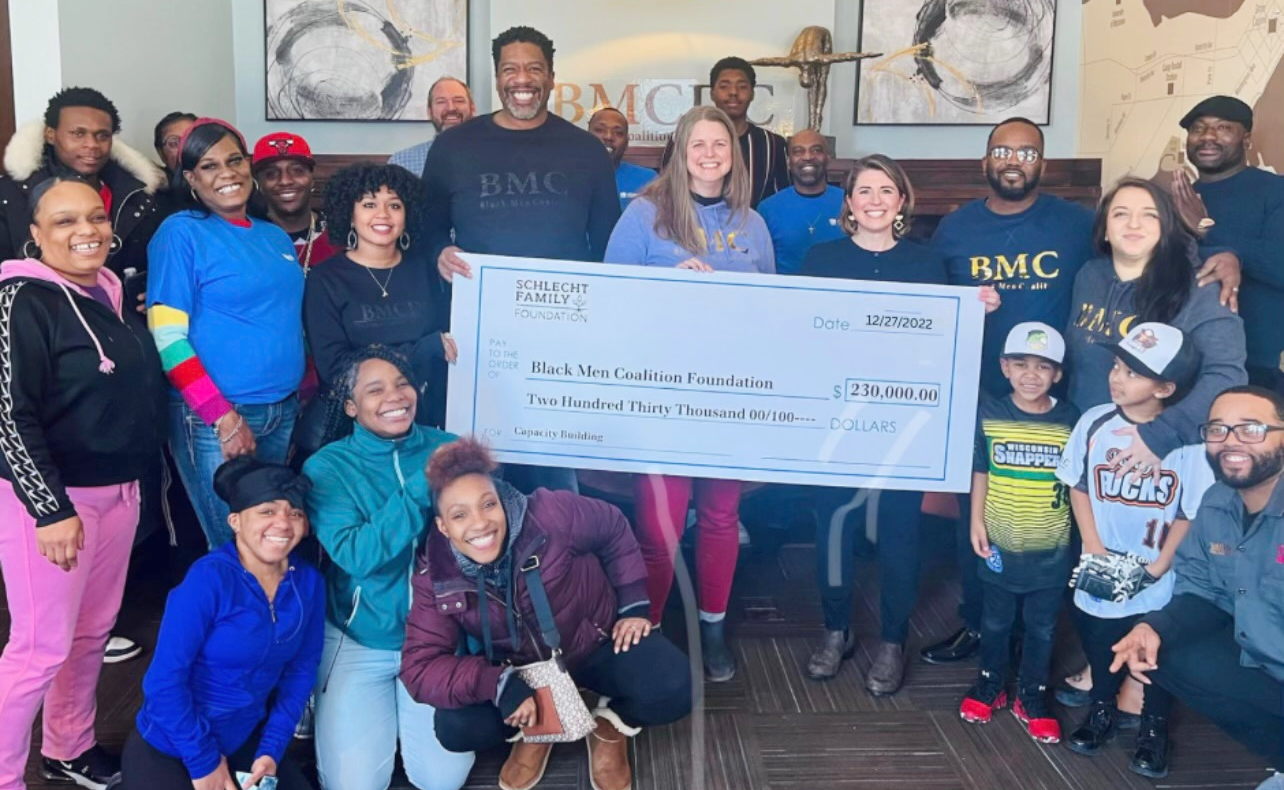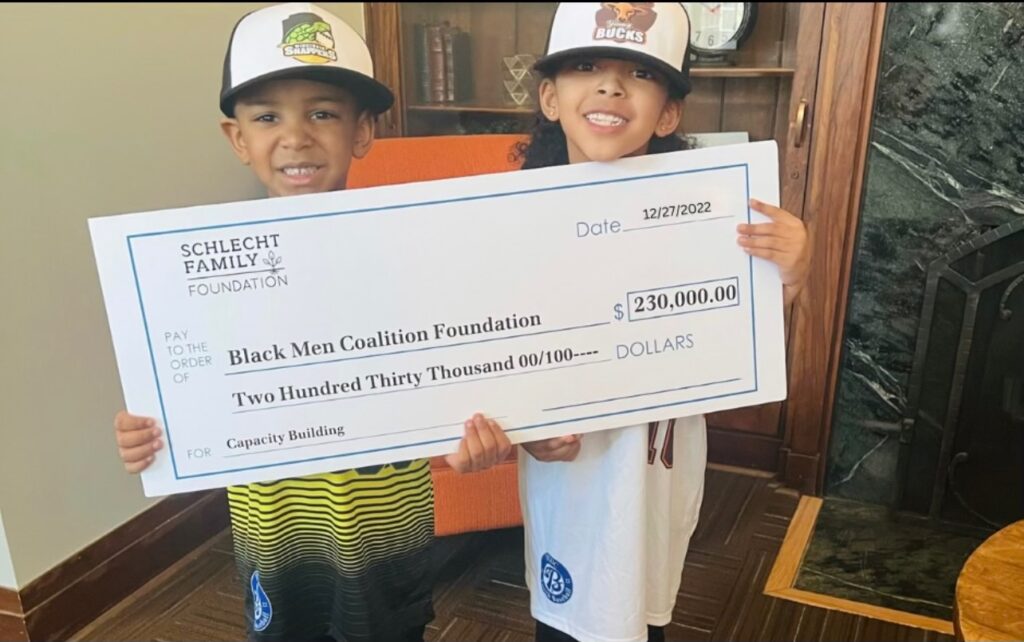
Corey Marionneaux, founder of Black Men Coalition, says that the $230,000 grant recently received from the Schlecht Family Foundation means that his organization will be able to serve many more people. And that’s something he’s really excited about.
“For us, this means growth. The work we’ve been doing at Black Men Coalition has been very limited because the team just wasn’t there and now we can create a team to really get things going where we want to go,” Marionneaux tells Madison365. “However, we have accomplished a lot without a team and with just many volunteers volunteering their time and working hard.
“Now we can actually hire people to actually do the work and make sure the work is done in a timely fashion which helps other people in our community with employment and financial literacy, getting more kids for our youth baseball program …. things of that nature.”
Stephanie Schlecht, executive director of the Schlecht Family Foundation, presented the oversized check to Black Men Coalition’s team, board of directors and community supporters on Jan. 31 at a celebration at the BMC headquarters on the Capitol Square. The grant, the largest the organization has received to date, will support BMC’s mission of actively changing people’s lives by “creating interconnected housing, employment, transportation and wrap-around services for our people.”
“We are very grateful to the Schlecht Family Foundation. We met with Stephanie Schlect, who is the daughter, and she really looked to see what we were doing and she really appreciated our work and wanted to see us do more,” Marionneaux recalls. “And so she decided to double the original amount that she was going to support us with. And I think that was pretty amazing.”
The Schlecht Family Foundation is a family philanthropy making investments in people and ideas that “transform and strengthen communities in Dane County and rural Wisconsin.”
“BMC is at a pivotal point in its growth and our grant is commensurate with the impact we believe is possible,” says Stephanie Schlecht. “Corey and his team are meeting people where they are with what they need when they need it. Jobs, housing, mentorship and fellowship: key ingredients to getting one’s life back on track. BMC and the men it serves are full of grit and ready to grow – these are values we support.”
For Black Men Coalition, the money will go towards a variety of programs and initiatives. According to Marionneaux, 40 employees are working and being supported by the BMC Foundation in receiving a minimum of $20 per hour at employers with upward mobility such as Plastic Ingenuity and Meriter Hospital. In addition, BMC provides transportation to/from work and financial literacy, including assisting with opening bank accounts, budgeting and credit repair.
Last year, BMC held its inaugural 100 percent free youth baseball league for kids ages 4 to 12 at Elver Park. The program was a big hit.
“Last year, we had 254 kids out for the baseball league. This year, we are really hoping to have more kids. But either way, it’s going to be amazing just to give our youth the opportunity to play baseball,” Marionneaux says. “I mean, in the World Series last year, there were zero U.S.-born Black players in it for the first time since the ’50s. This is happening all over the United States, obviously. And a lot of it is because kids are not getting the opportunity to be introduced into baseball. So by the time they get into high school, they don’t feel that they can even compete, so they’re just not playing the sport.

“We have to do something about that. So we started this youth baseball league and we plan to take it to other cities, as well, to light a spark so our youth can get more into the sport, which is one of America’s favorite sports,” he adds.
Baseball registration is now open for the 2023 season. You can do so here.
With all of its programs and initiatives, Marionneaux likes to tell people that the Black Men Coalition is “creating a system that works outside of a broken system.”
“For most of my adult life, I have been experiencing the broken system. And through my experience, I have learned what was necessary to help a person like myself — who has had a troubled past and dealt with so many issues — to make a transition to be a positive person,” Marionneaux says. “And for a lot of adults, especially Black men in our community, even if you want to do the right thing, the transition is very gloomy. So we just want to make a clear vision for people to make sure that they know that this is an opportunity and we’re here to make sure that you can get where you’re trying to go and ultimately become a better person in our community. We need systems that don’t create high recidivism. We need systems that don’t create such a large incarceration rate for Black men and Black youth. We need a system that has good mentoring for our youth and our kids so they can see other things besides maybe what they’re seeing in their homes — which may be good, but sometimes maybe it’s not such a healthy situation.”
No child gets the choice of where or which family they are going to be born into, Marionneaux adds.
“So we just want to create systems that work — which is our baseball program, our mentoring, financial literacy program, and employment services. We want to make sure a person that gets released from prison or county jail, or even if it’s a person who just needs a little leg up, can get them employed at a minimum of $20 an hour. And we want to make sure that we transport individuals to and from work so they can save money or just be able to get to work to do the work.
“These are the systems that need to be in place,” he adds.
In the near future, Marionneaux says BCM wants to focus more on housing, too.
“We want to make it where a person can get released, we can move them to our housing and they can start working the following day and we will transport them,” he says. “These are the systems that need to be in place to really slow down the recidivism and incarceration rate, especially for Black men. And we’re gonna focus on that as well.”



